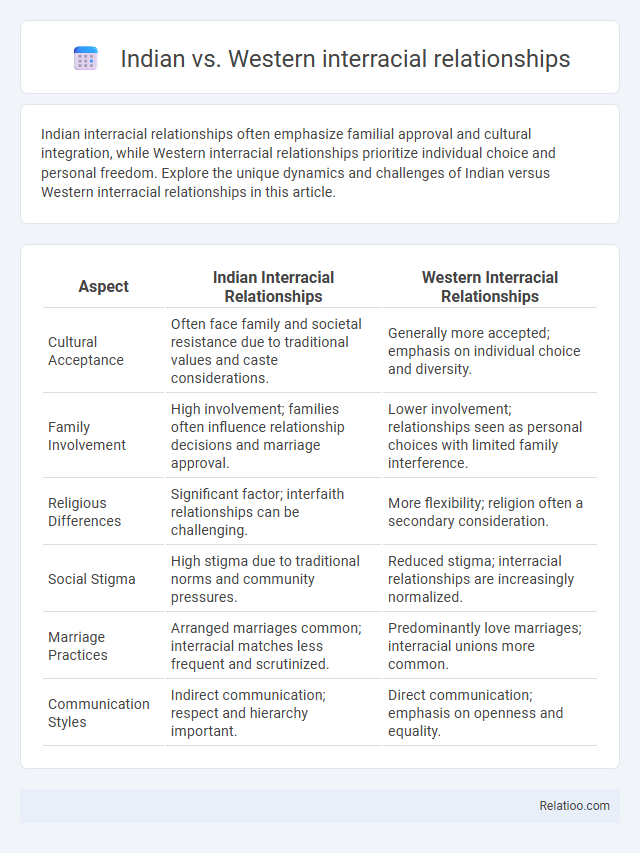Indian interracial relationships often emphasize familial approval and cultural integration, while Western interracial relationships prioritize individual choice and personal freedom. Explore the unique dynamics and challenges of Indian versus Western interracial relationships in this article.
Table of Comparison
| Aspect | Indian Interracial Relationships | Western Interracial Relationships |
|---|---|---|
| Cultural Acceptance | Often face family and societal resistance due to traditional values and caste considerations. | Generally more accepted; emphasis on individual choice and diversity. |
| Family Involvement | High involvement; families often influence relationship decisions and marriage approval. | Lower involvement; relationships seen as personal choices with limited family interference. |
| Religious Differences | Significant factor; interfaith relationships can be challenging. | More flexibility; religion often a secondary consideration. |
| Social Stigma | High stigma due to traditional norms and community pressures. | Reduced stigma; interracial relationships are increasingly normalized. |
| Marriage Practices | Arranged marriages common; interracial matches less frequent and scrutinized. | Predominantly love marriages; interracial unions more common. |
| Communication Styles | Indirect communication; respect and hierarchy important. | Direct communication; emphasis on openness and equality. |
Introduction to Indian vs Western Interracial Relationships
Indian vs Western interracial relationships reveal diverse cultural dynamics shaped by traditional values and modern perspectives. Indian interracial relationships often navigate family expectations, caste considerations, and societal norms, while Western couples typically emphasize individual choice and cultural blending. Understanding these differences helps you appreciate the unique challenges and strengths within each context.
Cultural Values and Family Expectations
Indian interracial relationships often face challenges rooted in traditional cultural values emphasizing caste, religion, and family honor, while Western interracial relationships generally involve more liberal attitudes toward individual choice and romantic freedom. Family expectations in Indian contexts frequently include pressure to marry within the same community or religion, contrasting with Western families that may be more accepting of diverse backgrounds and mixed heritage. Both settings reveal how deeply ingrained cultural beliefs and family dynamics shape the experiences and acceptance of interracial couples.
Approaches to Dating and Marriage
Indian interracial relationships often emphasize traditional values, with arranged marriage still playing a significant role, where family approval and cultural compatibility are prioritized. Western interracial relationships typically highlight individual choice and personal compatibility, focusing on love and mutual understanding rather than familial expectations. Your approach to dating and marriage may differ greatly depending on whether cultural traditions or personal autonomy are dominant factors in the relationship.
Navigating Religious Differences
Navigating religious differences in Indian vs Western interracial relationships requires understanding the deeply rooted cultural beliefs and rituals that may influence both partners. Indian interracial couples often encounter challenges blending Hindu, Muslim, Sikh, or Christian traditions with Western secular or diverse faith practices. Effective communication and mutual respect for each other's religious values foster harmony and bridge spiritual divides in these multicultural partnerships.
Communication Styles and Conflict Resolution
Indian interracial relationships often emphasize indirect communication and preserving harmony to avoid confrontation, while Western interracial relationships tend to favor direct and assertive communication for clarity. You may find that conflict resolution in Indian relationships involves subtle cues and collective decision-making, whereas Western couples typically engage in open dialogue and individual accountability. Understanding these cultural communication styles enhances empathy and strengthens your ability to navigate conflicts in interracial relationships.
Social Acceptance and Stereotypes
Interracial relationships, especially between Indian and Western partners, often face distinct social acceptance challenges shaped by cultural norms and stereotypes. Indian-Western couples may encounter traditional expectations around marriage and family roles, while Western contexts frequently emphasize individual choice but still grapple with racial and cultural prejudices. Understanding these nuanced social dynamics can help you navigate and challenge stereotypes to foster acceptance in diverse communities.
Role of Tradition and Modernity
Interracial relationships between Indian and Western partners often navigate the complex interplay of tradition and modernity, where Indian cultural values emphasize family approval and caste considerations, while Western perspectives prioritize individual choice and personal freedom. Your relationship may face unique challenges as traditional Indian norms, such as arranged marriage expectations and religious customs, contrast with Western ideals of romantic autonomy and egalitarian partnership. Understanding and balancing these differing cultural influences can foster mutual respect and strengthen the bond in interracial relationships.
Parenting and Raising Bicultural Children
Indian and Western interracial relationships often navigate distinct cultural expectations, which influence parenting styles and approaches to raising bicultural children. Indian families typically emphasize collectivism, respect for elders, and cultural rituals, while Western families may prioritize independence and open communication, creating a blend of traditions in bicultural upbringing. Successfully raising bicultural children in these relationships involves fostering cultural pride, bilingualism, and adaptive identity development to balance heritage and contemporary social dynamics.
Challenges and Success Stories
Indian and Western interracial relationships often face unique challenges stemming from cultural differences, language barriers, and societal expectations. Successful couples frequently report enhanced communication, mutual respect for diverse traditions, and overcoming prejudices through shared experiences. Data from studies on interracial couples highlight that strong emotional intelligence and adaptability significantly contribute to relationship longevity and satisfaction.
Future Trends and Evolving Mindsets
Interracial relationships between Indian and Western partners are witnessing a surge driven by globalization, digital connectivity, and increasing cultural exchange, reflecting broader societal acceptance and curiosity. Future trends indicate a growing emphasis on mutual respect for cultural heritage combined with personalized relationship dynamics, challenging traditional norms in both societies. Evolving mindsets highlight a shift towards valuing emotional compatibility and shared values over ethnic background, signaling a progressive move toward inclusivity and diversity in interracial partnerships.

Infographic: Indian vs Western interracial relationships
 relatioo.com
relatioo.com